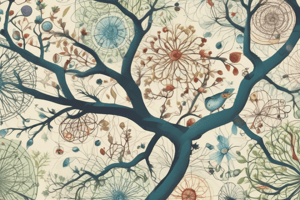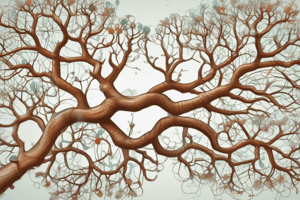Podcast
Questions and Answers
What is the primary focus of the branch of biology known as microbiology? updated
What is the primary focus of the branch of biology known as microbiology? updated
- Study of chemical processes in living organisms
- Study of plants
- Study of interactions between organisms and their environment
- Study of microorganisms (correct)
What is the process by which cells make copies of themselves?
What is the process by which cells make copies of themselves?
- Mitosis (correct)
- Osmosis
- Meiosis
- Photosynthesis
What is the term for the flow of genetic information from DNA to proteins? change
What is the term for the flow of genetic information from DNA to proteins? change
- Translation
- Protein synthesis
- Gene expression
- Transcription (correct)
What is the process by which water moves through a plant, from the roots to the leaves, and is then released into the air as water vapor?
What is the process by which water moves through a plant, from the roots to the leaves, and is then released into the air as water vapor?
What is the term for the 'building blocks of life'?
What is the term for the 'building blocks of life'?
What is the study of the structure, behavior, and evolution of the universe?
What is the study of the structure, behavior, and evolution of the universe?
Flashcards are hidden until you start studying
Study Notes
Branches of Biology
- Botany: study of plants
- Zoology: study of animals
- Microbiology: study of microorganisms (bacteria, viruses, etc.)
- Ecology: study of interactions between organisms and their environment
- Biochemistry: study of chemical processes in living organisms
- Molecular Biology: study of molecular structures and processes in living organisms
- Genetics: study of heredity and variation in organisms
Cell Biology
- Cell structure: plasma membrane, cytoplasm, nucleus, mitochondria, etc.
- Cell functions: metabolism, growth, reproduction, response to stimuli
- Cell division: mitosis (somatic cells), meiosis (gametes)
- Cellular transport: passive (diffusion, osmosis), active (carrier proteins)
Genetics
- Mendel's laws: segregation, independent assortment, dominance
- DNA structure: double helix, nucleotides, base pairing
- Gene expression: transcription, translation, protein synthesis
- Inheritance patterns: autosomal, sex-linked, polygenic, epistatic
Evolution
- Mechanisms: mutation, genetic drift, gene flow, natural selection
- Evidence: fossil record, comparative anatomy, molecular biology
- Types of evolution: microevolution, macroevolution, speciation
- Evolutionary relationships: phylogenetic trees, cladistics
Ecosystems
- Energy flow: producers, consumers, decomposers, trophic levels
- Nutrient cycling: carbon, nitrogen, oxygen, water
- Ecosystem services: provisioning, regulating, cultural, supporting
- Biomes: terrestrial (forest, grassland, desert), freshwater, marine
Biological Molecules
- Carbohydrates: sugars, starches, cellulose, glycogen
- Proteins: structure, function, amino acids, enzymes
- Lipids: fats, oils, cholesterol, phospholipids
- Nucleic acids: DNA, RNA, nucleotides, base pairing
Studying That Suits You
Use AI to generate personalized quizzes and flashcards to suit your learning preferences.




